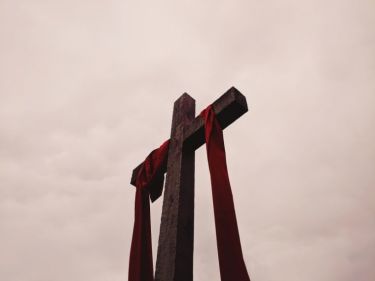
In the Christian year there are two penitential seasons, times of the year when Christians are particularly encouraged to take stock of their relationship with God and those things that prevent its flourishing.
The first is Advent, which is the penitential season that precedes Christmas, and the second is Lent, which is the penitential season that precedes Easter.
Lent (which is the season we are currently in) began on Ash Wednesday - forty-six days before Easter Sunday. Ash Wednesday is so called because on that day ashes are used as a visible symbol of penitence. The ashes are either placed on people’s heads or are used to draw a cross on their foreheads. Traditionally, this ‘imposition of ashes’ is accompanied by the words ‘Remember you are dust, and to dust you will return.’
These words are a deliberate echo of the words used by God when addressing Adam in Genesis 3:19:
‘In the sweat of your face you shall eat breadtill you return to the ground, for out of it you were taken;you are dust, and to dust you shall return.’
The setting of these words is the aftermath of Adam and Eve eating the fruit of the tree of the knowledge of good and evil even though Adam has been warned by God that ‘in the day you eat of it you shall die’ (Genesis 2:17).
These words do not threaten immediate death, but what they do warn is that the result of eating the forbidden fruit will be the death of the soul (the rupturing of a right relationship with God) leading to physical death and the eventual dissolution of the dead body and its return to the dust of which it was made.
In their original context the words of Genesis 3:19 are addressed to Adam alone. However, as the Bible makes clear, they are also a word addressed to Eve and to all the human beings who will descend from her and Adam, the collective humanity which the English language has traditionally called ‘man’ (what we now call ‘humankind’).
As CS Lewis explains in his book The Problem of Pain:
‘What man lost by the Fall was his original specific nature. “Dust thou art, and unto dust shalt thou return.” The total organism which had been taken up into his spiritual life was allowed to fall back into the merely natural condition from which, at his making, it had been raised … This condition was transmitted by heredity to all later generations, for it was not simply what biologists call an acquired variation; it was the emergence of a new kind of man — a new species, never made by God, had sinned itself into existence. The change which man had undergone was not parallel to the development of a new organ or a new habit; it was a radical alteration of his constitution, a disturbance of the relation between his component parts, and an internal perversion of one of them.’
What the traditional words used for the imposition of ashes on Ash Wednesday do is remind those who receive the ashes of the truth that Lewis describes and the still more awful truth that the radical alteration of the human constitution resulting from the sin described in Genesis 3 means that human beings face the prospect not only of physical death in this world, but what the Bible calls ‘the second death’ (Revelation 21:8), being forever alienated from God and all this is good in the world to come.
The Christian Church has traditionally judged it necessary to warn people of these awful truths at the start of Lent so that they realise that they need to spend Lent making sure that their relationship with God is such that although they may die physically they will not then experience the second death.
At this point someone might ask: ‘How is it possible for someone to avoid the second death? You have just said that it is a prospect that all human beings have to face.’
The answer to this question is that though everyone faces the possibility of eternal death, it is not necessary that they experience it. This is because God’s relationship with the human race did not end at Genesis 3:19.
As St Athanasius explains in his book On the Incarnation of the Word, God could not simply ignore what Adam and Eve had done:
‘Had it been a case of a trespass only, and not of a subsequent corruption, repentance would have been well enough; but when once transgression had begun men came under the power of the corruption proper to their nature and were bereft of the grace which belonged to them as creatures in the Image of God. No, repentance could not meet the case. What — or rather who was it that was needed for such grace and such recall as we required? Who, save the Word of God Himself, who also in the beginning had made all things out of nothing? His part it was, and his alone, both to bring again the corruptible to incorruption and to maintain for the Father his consistency of character with all. For he alone, being Word of the Father and above all, was in consequence both able to recreate all, and worthy to suffer on behalf of all and to be an ambassador for all with the Father.’
By the ‘Word’ of God Athanasius means God the Son, the eternal Word through all things were made (John 1:1-3), and as he goes on to say, the Word:
‘….moved with compassion for our limitation, unable to endure that death should have the mastery, rather than that his creatures should perish and the work of his Father for us men come to nought, took to himself a body, a human body even as our own…. He, the Mighty One, the artificer of all, himself prepared this body in the virgin as a temple for Himself, and took it for his very own, as the instrument through which he was known and in which he dwelt. Thus, taking a body like our own, because all our bodies were liable to the corruption of death, he surrendered his body to death instead of all, and offered it to the Father.’
In these two quotations Athanasius unpacks the meaning of Paul’s words in 1 Corinthians 15: 46-49:
‘But it is not the spiritual which is first but the physical, and then the spiritual. The first man was from the earth, a man of dust; the second man is from heaven. As was the man of dust, so are those who are of the dust; and as is the man of heaven, so are those who are of heaven. Just as we have borne the image of the man of dust, we shall also bear the image of the man of heaven.’
In these words ‘the first man’ is a reference to Adam and the ‘man of heaven’ is a reference to God the Son, the Word who became flesh in the way, and for the reason, described by Athanasius.
In addition, the ‘we’ in the last sentence refers to Christian believers. What God the Son did as a result of his incarnation made it possible for all human beings to cease to be subject to the dominion of death and become instead people who possess eternal life both now and in the world to come. However, there is a condition, namely belief. As Jesus declares in John 11:25-26: ‘I am the resurrection and the life; he who believes in me, though he die, yet shall he live, and whoever lives and believes in me shall never die.’
Furthermore, believing doesn’t just mean making an initial act of intellectual assent to the gospel message, it means continuing to live faithfully as a believer through the whole of our lives. ‘The one who perseveres to the end shall be saved’ (Matthew 24:13). However, we cannot live faithfully before God in this way in our strength. We have to receive God’s help, and that means we have to ask for it because God will not impose his assistance upon us.
The traditional words that accompany the ashes, by reminding us of our natural condition as fallen creatures, remind us of our need to ask for God’s help. And a good model for our asking is provided by the following words from the Prayer Book funeral service:
‘Man that is born of a woman hath but a short time to live, and is full of misery. He cometh up, and is cut down, like a flower; he fleeth as it were a shadow, and never continueth in one stay.
'In the midst of life we are in death: of whom may we seek for succour, but of thee, O Lord, who for our sins art justly displeased?
'Yet, O Lord God most holy, O Lord most mighty, O holy and most merciful Saviour, deliver us not into the bitter pains of eternal death.
'Thou knowest, Lord, the secrets of our hearts; shut not thy merciful ears to our prayer; but spare us, Lord most holy, O God most mighty, O holy and merciful Saviour, thou most worthy Judge eternal, suffer us not, at our last hour, for any pains of death, to fall from thee.’




